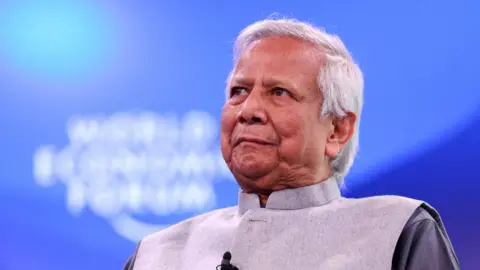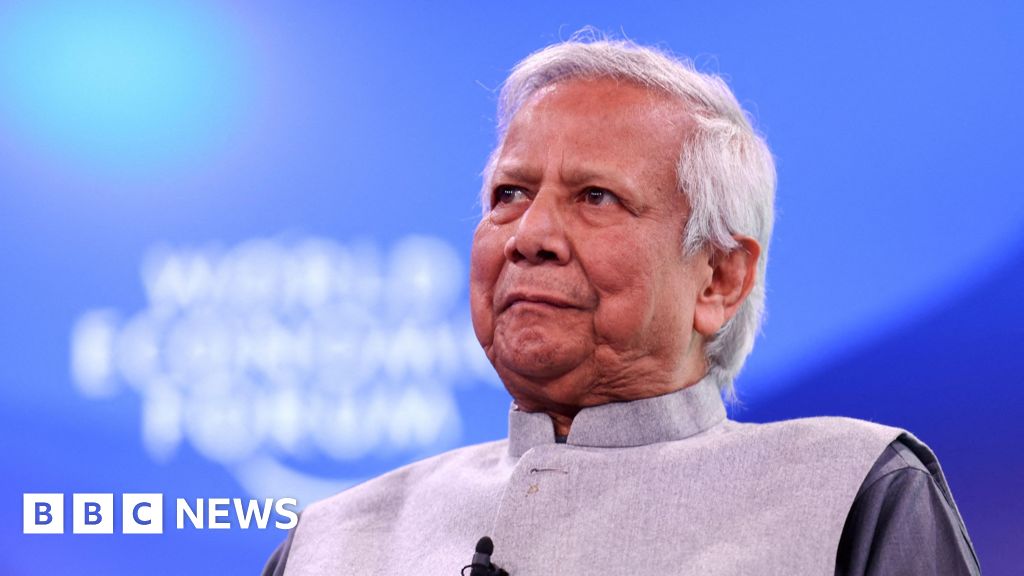Political reporter
Correspondent
Senior journalist


Bangladesh’s interim leader Muhammad Yunus has refused to meet Labour MP Tulip Siddiq to discuss corruption allegations against her during his visit to London.
Yunus told the BBC the allegations were a “court matter” and said he had confidence in Bangladesh’s Anti-Corruption Commission (ACC), which is investigating Siddiq.
The ACC has accused Siddiq of illegally receiving land from the regime of her aunt Sheikh Hasina, who was ousted as Bangladesh’s prime minister last year.
Siddiq, a former Treasury minister, has denied the allegations and accused the Bangladeshi authorities of a “politically motivated smear campaign”.
In a letter, Siddiq requested a meeting with Yunus, a Nobel-prize winning economist who has led an interim government in Bangladesh since a student-led protest movement toppled Hasina from power.
Siddiq said a meeting “might also help clear up the misunderstanding perpetuated by the Anti-Corruption Commission in Dhaka”.
In an interview with the BBC, Yunus was asked whether he would meet Siddiq during his four-day visit to the UK this week.
“No I’m not because it’s a legal procedure,” Yunus said. “I don’t want to interrupt a legal procedure. Let the procedure continue.”
Siddiq has argued Bangladeshi authorities have not provided any evidence to back up their allegations and refuse to engage with her lawyers.
Responding to those arguments, Yunus said: “It’s a court matter.
“A court will decide if enough materials are available to pursue the case or cancel it”.
When asked if prosecutors in Bangladesh needed to be more transparent and provide evidence of wrongdoing to Siddiq, Yunus said: “As chief adviser I have full confidence in our Anti-Corruption Commission and they are doing the right thing.”
On the question of whether he would seek Siddiq’s extradition if she was found guilty of any crimes in Bangladesh, Yunus said: “If it is part of the legal procedure, of course.”
‘Fantasy accusations’
In a statement, Siddiq said she was disappointed Yunus had refused to meet her.
She said: “He’s been at the heart of a political vendetta based on fantasy accusations with no evidence relentlessly briefed to the media.
“If this was a serious legal process they would engage with my lawyers rather than sending bogus correspondence to an address in Dhaka where I have never lived.
“I hope he is now serious about ending the practice of smearing me in the press and allowing the courts to establish that their investigations have nothing to do with me – a British citizen and a proud member of the UK Parliament.”
Siddiq quit her ministerial post earlier this year, following an investigation into the allegations by the prime minister’s ethics adviser, Sir Laurie Magnus.
In his report, Sir Laurie said he had “not identified evidence of improprieties”.
But he said it was “regrettable” that Siddiq had not been more alert to the “potential reputational risks” of her ties to her aunt, who is leader of Awami League party in Bangladesh.
Bangladesh authorities estimate that about $234bn (£174bn) was siphoned off from Bangladesh through corrupt means while Hasina was in power.
The Bangladeshi authorities allege that much of this money has been stashed or spent in the UK.


Yunus said he had not been able to arrange a meeting with Prime Minister Sir Keir Starmer, a close friend and constituency neighbour of Siddiq.
He said: “I don’t know whether I should be disappointed or he should be disappointed. It’s a missed opportunity.
“That’s why I’m saying coming to Bangladesh would be a good opportunity to relax and see and feel the moment.”
When asked if Downing Street had given a reason for not scheduling a meeting with Starmer, he said: “I don’t think we have received an explanation from that kind of thing. Probably he is busy with other important things.”
A Downing Street spokesperson did not comment.
But Yunus did have an audience with King Charles at Buckingham Palace and met Business Secretary Jonathan Reynolds in Parliament.
In a post on X, Reynolds said they discussed “our shared ambitions for economic growth, job creation and prosperity”.
Some anti-Yunus protesters from the Bangladeshi community in the UK gathered on Parliament Square during his visit.
Yunus said Bangladesh’s interim government had hired lawyers to try to recover any allegedly stolen funds from the UK.
He said the UK government was “extremely supportive” of this effort.
“I have a lot of admiration for the promptness with which they’re treating the whole subject,” Yunus said.
The BBC understands the International Anti-Corruption Co-ordination Centre (IACCC) is exploring opportunities to assist Bangladesh’s interim government and its law enforcement agencies in their efforts to investigate allegations of corruption under Hasina’s rule.
The IACCC is hosted by the National Crime Agency in London.
An NCA spokesperson said: “The NCA does not routinely comment on the nature of international assistance, nor confirm or deny if the Agency has opened an investigation or is supporting a partner’s investigation.”


